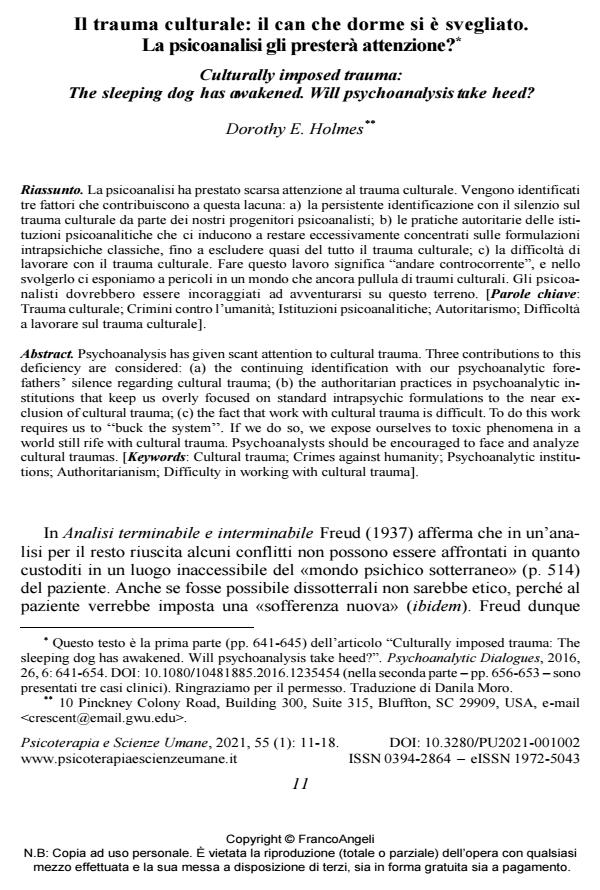Il trauma culturale: il can che dorme si è svegliato. La psicoanalisi gli presterà attenzione?
Titolo Rivista PSICOTERAPIA E SCIENZE UMANE
Autori/Curatori Dorothy E. Holmes
Anno di pubblicazione 2021 Fascicolo 2021/1
Lingua Italiano Numero pagine 8 P. 11-18 Dimensione file 275 KB
DOI 10.3280/PU2021-001002
Il DOI è il codice a barre della proprietà intellettuale: per saperne di più
clicca qui
Qui sotto puoi vedere in anteprima la prima pagina di questo articolo.
Se questo articolo ti interessa, lo puoi acquistare (e scaricare in formato pdf) seguendo le facili indicazioni per acquistare il download credit. Acquista Download Credits per scaricare questo Articolo in formato PDF

FrancoAngeli è membro della Publishers International Linking Association, Inc (PILA), associazione indipendente e non profit per facilitare (attraverso i servizi tecnologici implementati da CrossRef.org) l’accesso degli studiosi ai contenuti digitali nelle pubblicazioni professionali e scientifiche.
La psicoanalisi ha prestato scarsa attenzione al trauma culturale. Vengono identificati tre fattori che contribuiscono a questa lacuna: a) la persistente identificazione con il silenzio sul trauma culturale da parte dei nostri progenitori psicoanalisti; b) le pratiche autoritarie delle istituzioni psicoa-nalitiche che ci inducono a restare eccessivamente concentrati sulle formulazioni intrapsichiche classiche, fino a escludere quasi del tutto il trauma culturale; c) la difficoltà di lavorare con il trauma culturale. Fare questo lavoro significa "andare controcorrente", e nello svolgerlo ci esponiamo a pericoli in un mondo che ancora pullula di traumi culturali. Gli psicoanalisti dovrebbero essere incoraggiati ad avventurarsi su questo terreno.
Parole chiave:Trauma culturale; Crimini contro l’umanità; Istituzioni psicoanalitiche; Autoritarismo; Difficoltà a lavorare sul trauma culturale
Dorothy E. Holmes, Il trauma culturale: il can che dorme si è svegliato. La psicoanalisi gli presterà attenzione? in "PSICOTERAPIA E SCIENZE UMANE" 1/2021, pp 11-18, DOI: 10.3280/PU2021-001002